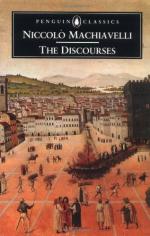
|
| Name: _________________________ | Period: ___________________ |
This quiz consists of 5 multiple choice and 5 short answer questions through Book One, The Development of Rome's Constitution, Sundry Reflections on the Kings of Rome, The Introduction of New Forms of Government, Ingratitude.
Multiple Choice Questions
1. According to Machiavelli in Section 1 of Book One, who are the two types of people who build cities?
(a) Princes and generals.
(b) Farmers and merchants.
(c) Men born in their location or foreigners.
(d) Craftsmen and politicians.
2. What does Machiavelli consider prudence in a Prince or a King?
(a) Picking battles that are important enough to fight and small enough to win.
(b) In times of peace not neglecting the arrangements of war.
(c) Knowing that the enemy of his enemy is his friend.
(d) Keeping friends close and enemies closer.
3. How long did Sparta peacefully exist without changing its laws, according to Machiavelli?
(a) Until its domination by Rome.
(b) 350 years.
(c) 800 years.
(d) Through the reign of Lycurgus.
4. According to Machiavelli, what type of people seek what office to cause a city to become corrupt?
(a) The working poor seek to become plebes.
(b) Weak and dependent people seek to become senators.
(c) The rich and powerful, rather than the virtuous, seek to become judges (magistrates).
(d) Generals seek to become senators.
5. What historical records did Machiavelli use to support his point for keeping two important items out of peril?
(a) Historical records of Hannibal and England.
(b) Historical records of military tactics.
(c) Historical records of Tullus and Metius.
(d) Historical records of Rome and France.
Short Answer Questions
1. What was the inspiration for Machiavelli's "The Discourses"?
2. Why does Machiavelli suggest that those who have received great rewards should not be spared punishments for acting badly?
3. What is a Prince as Machiavelli uses the term?
4. What can be inferred of Machiavelli's view of freedom based upon reading view of weak and strong Princes?
5. From what did Machiavelli develop the information that he wrote into "The Discourses"?
|
This section contains 476 words (approx. 2 pages at 300 words per page) |

|




